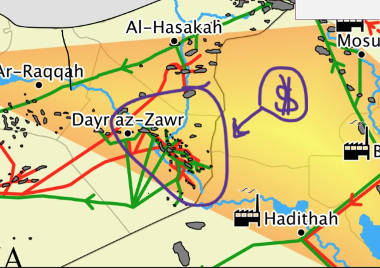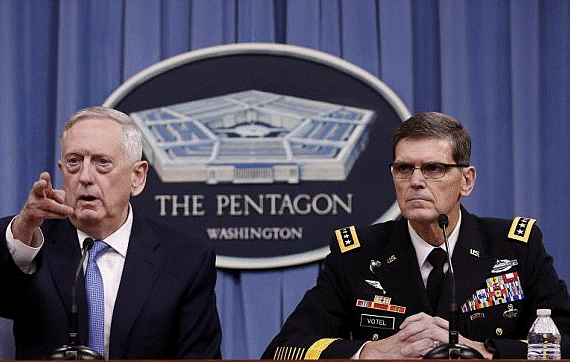Bulletin N° 785
“World War 3 Between America and China”
https://www.youtube.com/watch?v=UfgCn7GV0Kc
Subject
: A Social History of 20th-Century
‘Fight or Flight’ Patterns & the 21st-Century World Capitalist System.
11 February 2018
Grenoble, France
Dear Colleagues and Friends of CEIMSA,
I have been asked about Anglophone
news sources for current events
and have responded to individual queries by sending the following CEIMSA link
which I used regularly as a research tool for undergraduate classes in American
Studies at Grenoble U.
http://www.ceimsa.org/liens.html
My interest in the role played by intellectuals in
times of imperialist conflicts has taken me to the history of pre-Nazi Germany
and the biographical histories written by Fritz Stern (1926-2016), the godson
of Fritz Haber and former member of the Editorial and Executive Committees of
The Collected Papers of Albert Einstein at Princeton University. In the
introduction of his book, Einstein’s German World (1999), Stern alerts his
readers to what he perceived as a “German lesson of the twentieth century – for
all of us.” We are about to read about the “evils that the passivity of decent
citizens can bring about.”(p.10)
The book represents an unusual mélange of
intellectual and social history, surprisingly uncritical of the global forces
of capitalism which were so important in reducing Germany on two separate
occasions to a pathological state of nationalism and militarism in the first
half of the 20th Century. This complete disregard for critical
economic analysis brings Stern to focus on human
failures as the cause of the German imperialist experiments. Rather than
reflecting Christopher Hill’s essentially democratic socialist premise from the
study of English
social history: “All but for the grace of god, there go I!” (in
The
World Turned Upside Down), Stern concludes quite logically from his
premise of liberal individualism that: “formal unification [in 1989] gave Germany
that rarest of opportunities, a second chance: this time to become the
preeminent power of Europe in a peaceful fashion.”(Einstein’s
German World, p.10)
In his biographical sketch of Max Planck, Stern
writes that during a talk at his university on August 3, 1914, Plank warned:
“We do not know what tomorrow will bring. We sense only that almost at once
something great and terrifying faces our people, that
our homes and lives will be at stake, and the honor, perhaps the survival, of
the father land. But we can also see and feel in the frightful gravity of the
situation that all the moral and physical powers of the country are begin fused
into a single whole, bursting to heaven in a flame of sacred rage.”(44)
The great German scientists, who only days
and weeks before were extolled around the world, heard the harsh accusations
made
against Germany and decided to respond in its defense. The result as the
‘Manifesto of the 93’, which denied German
responsibility
for the outbreak of the war, defended the breach of Belgium’s neutrality,
dismissed as fabrications the alleged
atrocities
committed by German troops, and proclaimed the identity of German militarism
with German culture. The manifesto
was
signed by Planck and Harnack, Fritz Haber and Paul
Ehrlich, and other leading figures. The effect abroad was disastrous.
For years to come, the
manifesto remained a moral pawn in the hands of the enemy.
In an article for the Chicago magazine, In These Times, Stern wrote in October 2005
that, “The rise of National
Socialism proved politics and religion don’t mix”; this was another lesson
he drew from 20th-century German history.
The 23 items below include both descriptive
and analytical essays exposing the dark side of imperialist expansion in our
contemporary world. Readers will find that once again we are confronted with
what German intellectuals described as a “fight or flight” situation, in which
they all too often chose flight, until it was too late and they were overcome
by events, sometimes finding themselves collaborating with the most destructive
forces.
Sincerely,
Francis Feeley
Professor emeritus of American Studies
University Grenoble-Alpes
Director of Research
University of Paris-Nanterre
Center for the Advanced Study of
American Institutions and Social Movements
The University of California-San Diego
|
|
===========
b.
Is the Stock
Market Rigged?
http://www.informationclearinghouse.info/48762.htm
by Paul Craig Roberts, Dave Kranzler, and Michael Hudson
On
February 6 PCR asked if the Plunge Protection Team had
stepped in and prevented a stock market correction by purchasing equity index
futures. Sure enough, the daily exchange volume chart shows an increase in
futures activity on February 2 with sharp increases on Feb. 5th and 6th. Those
are the days when the stock market averages were experiencing large point
drops. So, ask yourself, would you purchase equity futures while experiencing cumultive stock market drops? One can understand shorting a
dropping market, but not buying futures.
===========
c.

The Era of Easy Money Is Ending, and the World Is
Bracing for Shocks
by Peter S. Goodman
===========
d.

Stock
Markets Implode Worldwide
What’s
Next?
https://zcomm.org/znetarticle/stock-markets-implode-worldwide-whats-next/
by Jack Rasmus
===========
e.
People Are Panicking
About the Stock Market—But It Doesn’t Have to Be This
Way
Remember pensions?
by Helaine Olen
===========
f.
Trump
& the Fed
https://zcomm.org/znetarticle/trump-the-fed/
by
Jack
Rasmus
===========
g.
The
Fights Within the US Ruling Elite
https://zcomm.org/zvideo/the-fights-within-the-us-ruling-elite/
by
Doug Henwood and Gregory Wilpert
===========
h.
US sanctions, baffled
Russians, hot air and history
https://thesaker.is/us-sanctions-baffled-russians-hot-air-and-history/
The Saker
===========
i.
Worst Case Economics
http://dollarsandsense.org/blog/2018/01/worst-case-economics.html
by Frank
Ackerman
Frank Ackerman is principal economist at Synapse Energy
Economics in Cambridge, Mass., and the author of Worst Case Economics: Extreme Events in Climate and
Finance (Anthem Press,
2017). He spoke to Triple Crisis co-editor Alejandro Reuss
in late December 2017 about the main themes in the book.
===========
j.
Surveillance
Capitalism
http://www.informationclearinghouse.info/48768.htm
by Tucker Carlson
How
Google Is Tracking You
Google uses information
for "surveillance capitalism" - selling advertisements for stuff
based on your activities, locations and characteristics.
===========
k.
China’s
latest move in the graveyard of empires
http://thesaker.is/chinas-latest-move-in-the-graveyard-of-empires/
by
Pepe Escobar
Beijing’s
strategic priority is to prevent ETIM fighters exiled in Afghanistan crossing
the Wakhan Corridor to carry out operations in
Xinjiang
The
latest plot twist in the endless historical saga of Afghanistan as a graveyard
of empires has thrown up an intriguing new chapter. For the past two
months, Beijing and Kabul have been discussing the possibility of setting up a
military base alongside Afghanistan’s border with China. “We are going to
build it [the base] and the Chinese government has committed to help
financially, provide equipment and train Afghan soldiers,” Mohammad Radmanesh, a spokesman for the Afghan Ministry of Defense,
admitted to the AFP.
===========
l.
Hour
of the Furnaces:
Imperial Finance and the Colonization
of
Daily Life
https://www.viewpointmag.com/2018/02/01/hour-furnaces-imperial-finance-colonization-daily-life/
by Morgan Adamson
===========
m.
Transnational
Capital
and
Transnational Labor
http://www.dollarsandsense.org/archives/2017/1117tabb.html
An
Interview with William K. Tabb
William
K. Tabb is an economist and author of The
Restructuring of Capitalism in Our Time
(2012), Economic Governance in the Age of Globalization (2004), and The Amoral Elephant:
Globalization and the Struggle for Social Justice in the Twenty-First Century (2001). He spoke with Dollars &
Sense in July 2017 on the global
economic crisis, its causes and consequences; the transnational capitalist
class and neoliberal globalization; and the prospects for resistance and
alternatives to capitalism now and in the future.
===========
n.
Syria - U.S. May Have Arranged "Self Defense"
Attack On Syrian Government Forces
http://www.informationclearinghouse.info/48754.htm
by
Moon Of Alabama
Last night the illegal U.S.
occupation force in north-east Syria attacked a group of Syrian government
aligned troops and their Russian support. The incident happened north-east of Deir Ezzor city on the east side
of the Euphrates. The U.S. claims that it killed some 100 Syrian soldiers that
were allegedly attacking its proxy forces in an attempt to recover oil fields.
There is a factual separation of
areas south-west of the Euphrates under Syrian government control and
north-east of the Euphrates under U.S. occupation. But several locations around
Manbij, Raqqa and Deir Ezzor contradict that and
are under control of the respective other side. The U.S. claims that a
"de-confliction line" along the Euphrates is agreed upon. The Syrian government
says that no such agreement exists.
An small area across the Euphrates north-east of Deir Ezzor had been taken by
Syrian government forces months ago. It is near some oilfields which the U.S.
wants to keep away from the Syrian government.

"The U.S. wants to keep Syria
weak and poor," says Prof. Joshua Landis. According to Landis the
U.S. is keeping the north-east of Syria under occupation to deny Syria access
to its oil and its best agricultural land. It wants to turn Syria into a swamp
for Russia and Iran to the benefit of mostly Israel.
===========
o.
NYC Taxi Driver Kills Himself at City Hall
After Condemning Uber &
Politicians for Financial Ruin
https://www.democracynow.org/2018/2/7/nyc_taxi_driver_kills_himself_at
New
York City taxi drivers held a vigil on Tuesday to honor livery car driver
Douglas Schifter, who killed himself in front of City
Hall Monday morning after writing a long Facebook
post condemning local politicians and Wall Street-backed apps like Uber for pushing him into financial ruin. He wrote, “I
worked 100-120 consecutive hours almost every week for the past fourteen plus
years. When the industry started in 1981, I averaged 40-50 hours. I cannot
survive any longer with working 120 hours! I am not a Slave and I refuse to be
one. … There seems to be a strong bias by the Mayor and Governor in favor of Uber. A Company that is a known liar,
cheat and thief.” Over the past five years, the number of for-hire cars
has more than doubled in the city, largely thanks to Uber.
But the soaring number of cars has resulted in a financial crisis for many
longtime taxi drivers who now struggle to get customers. We speak to Bhairavi Desai, executive director and co-founder of the
New York Taxi Workers Alliance, which represents over 19,000 taxi drivers in
New York City.
===========
p.
What
Is U.S. Workers’ Share of National Income?
http://www.dollarsandsense.org/archives/2017/1117macewan.html
by Arthur MacEwan
Dear
Dr. Dollar:
How
well do U.S workers fare in relation to workers in other countries when you
compare workers’ shares of national income?
Not
so well. That’s the answer that we can readily obtain from what is now well
known about income inequality in the United States and other countries. Among
high-income countries, the United States is one of the most unequal, if not the
most unequal. Under these circumstances, it is pretty clear that workers are
getting a smaller share of national income in this country than in most other
high-income countries. We do, in addition, have some other information that
helps in answering this question. The International Labour
Organization provides data on “labor’s share” of national income for several
countries. These data are shown in Table 1 for 2013. (More recent data were not
available.) The United States does not do so well, falling about in the middle
of the countries shown in Table 1.
===========
q.
John William’s Shadow Government Statistics
Analysis Behind and Beyond Government Economic Reporting
Alternate Unemployment Charts
http://www.shadowstats.com/alternate_data/unemployment-charts
+
Daily Job Cuts. Com
===========
r.
Trump
and National Neoliberalism, Revisited
http://www.dollarsandsense.org/archives/2018/0118breger-bush.html
BY SASHA BREGER-BUSH
About
ten years ago, political theorist Sheldon Wolin
published Democracy Incorporated,
diagnosing American democracy with a potentially fatal corporate disease.
Referring to the specter of “inverted totalitarianism,” Wolin
writes in his preface:
“Primarily it represents the political
coming of age of corporate power and the political demobilization of the
citizenry. Unlike the classic forms of totalitarianism [e.g. Germany, Italy],
which openly boasted of their intentions to force their societies into preconceived
totality, inverted totalitarianism is not expressly conceptualized as an
ideology or objectified in public policy. Typically it is furthered by
power-holders and citizens who often seem unaware of the deeper consequences of
their actions or inactions. There is a certain
heedlessness, an inability to take seriously the extent to which a pattern of
consequences may take shape without having been preconceived. Wolin paints a picture of a gradual process of change in
which many different actors, some wealthy and powerful and others not,
unwittingly push the country’s politics, bit by bit in piecemeal fashion,
towards an undemocratic, corporate-controlled end. Many of these actors may
have good intentions. Many of them may see themselves as champions of the people.
Many of them may actually speak out against the very interests that they in
other ways empower.”
===========
s.
Pentagon Unveils Strategy For Military
Confrontation
With Russia And China

===========
t.
Imperialism on Trial
http://www.informationclearinghouse.info/48760.htm
by George Galloway and Eva Bartlett
Writers and activists convene in Derry, Ireland
George Galloway‘s speech was a detailed, animated, history lesson of Imperialist crimes, threats and lies, past and present.
Posted February 08, 2018
===========
u.
|
===========
w.
![]()
Top Eleven Dollars & Sense Charts and
Graphs of 2016
http://www.dollarsandsense.org/archives/2016/1216topeleven.html
We’re
getting to the end of the year, and you know what that means. ’Tis the season for Top Ten lists! Here at Dollars & Sense, we try to tell
the most important stories about economic life, in the United States and around
the world, in a number of different ways. And one of those ways is charts and
graphs.
Here
we have compiled our favorite graphs from the past year of Dollars & Sense. They’re not in
rank order, so it’s not a countdown to the #1 Greatest Graph of the Year.
Rather, we think that, together, these charts and graphs present a compelling
picture of current economic issues. (This year our graph-rich articles focused
mostly on the United States, but we covered plenty of places outside the U.S.,
including the Spanish left, Brexit in historical context, the crisis of European
social democracy (here
and here), and the
so-called “emerging economies.”) And again, for the third year in a row, we
invoke the spirit of Nigel Tufnel and cranked it up to eleven.


